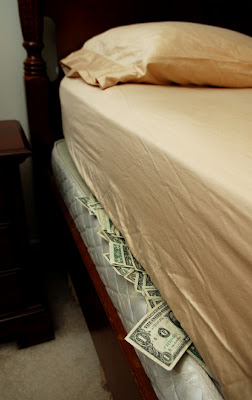
Nothing is guaranteed in the stock market. As much as some people like to make trading out to be some get-rich-quick scheme, with fool-proof technical indicators and secret penny stock picks, that couldn’t be further from reality. Trading and investing are difficult endeavors, and wild gyrations in the market are often shaped by completely random events out of our control. In previous posts I have written about how discipline and money management are important for a trader in a strictly trading sense. Today, I want to talk about how those same principles are important for a trader in a personal way.
Trading can be an extremely volatile and stressful profession. The same applies for retail investing, when people put their hard earned money into the markets. Losses are always painful and cause anxiety; it is a programmed human response. In my opinion, however, trading, like any job, is only as volatile and stressful as you make it. On a trading floor during any given day, you will hear several melt downs. Traders slam their keyboards and punch their computer screens. People feel that the market should or shouldn’t do certain things, and that is what gets them in trouble. Stocks don’t owe us anything; it is our responsibility to achieve some semblance of control in a market defined by utter chaos.
The only way you will survive in the business long-term is if you take the stress out of the equation. Sounds simple, but how do you accomplish that? Let me share a brief story. When I was in my mid 20’s and first started in the trading business, I was in debt. For a period of time I was living well beyond my means. I hated owing money, though. I vowed that once I got out of debt, I would never allow myself to fall back into it. Luckily, I started my career during a lucrative time in the markets and was able to quickly climb out of that hole. Henceforth, I made a commitment to living within my means.
You take the stress out of trading by not having to make money every day, every week, or every month. My trading style lends itself to consistency, but it is hardly the same way for everyone. You have to have realistic expectations for yourself, and make sound decisions once you scratch the surface of success. The nature of trading—the fact that you can make a lot of money very quickly if you are right—attracts a lot of gamblers. As I wrote in a previous post, trading is not gambling, and if you treat it that way you will be out the door in no time. I have been around many traders who had monster days, monster months, and even monster years, but when I look back on many of those same people today, they are in heavy debt, broke, and out of the markets.
The impulsive gambler spends all of his money, and doesn’t, in anticipation of precipitation, stack chips for a rainy day (to quote Jay-Z). The prudent trader saves his money and gives himself a cushion. Money makes money. Success breeds success. The more of a cushion you give yourself, the less stress and pressure you feel. The less stressed you are, the more clear headed you are each day you sit down at your trading desk. The more clear-headed you are, the better you are able to stick to your trading rules. My trading improved dramatically once I was out from under the burden of debt. Some individuals mortgage their house to start a trading account and go for broke, others jump into a trading career out of college without enough savings or another source of income, putting themselves under tremendous pressure to make money right away. That is a recipe for disaster. The reality is that there is a learning curve for new traders to make any money period, and if you haven’t packed away some acorns for winter, you are going to be left sitting out in the cold. Saving money is good for your health in the same way it is good for your trading career. You can’t go through your career tightly wound by stress.
Another reality, after profitability is achieved, is that most traders are going to have ups and downs, hot streaks and slumps. That is where my prudence becomes important nowadays. When you have that big month, don’t get over excited, don’t go out and buy a Porsche, don’t pop bottles with models four nights a week. Be proud of yourself, and stuff that money under your mattress to give yourself some extra cushion. When I have a $50,000 month, I don’t change my lifestyle, because I know every month is not going to be like that. The market is cyclical. Conditions change month to month, year to year and decade to decade. I save my money and relieve a little bit more pressure. The same ideas apply to investing; you should never put money in the markets that you can’t afford to lose.
Trading is whatever you make it. It can be a casino if that is how you approach it. I choose to run my trading like a small business, and that is what it has become. While my quarterly earnings reports may fluctuate, my balance sheet continues to grow. I say these things not to gloat about my success or make people think I am some rich snob. I just want traders and investors to understand that, in my experience, what it takes a disciplined approach to saving money and growing your wealth to succeed long-term in the stock market. You have to take the stress out of the job, or else your career may be cut short.



